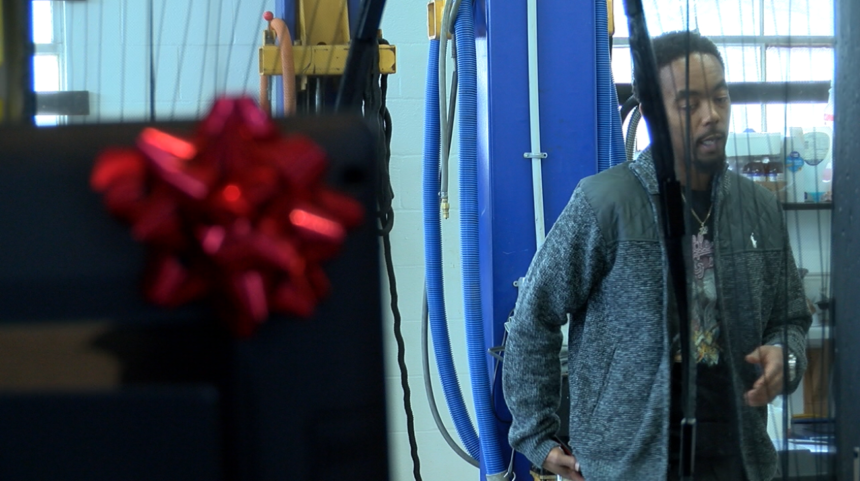Supreme Court decision puts Columbia business owner’s future in question

COLUMBIA, Mo. (KMIZ)
Dimetrious Woods wants to build something.
Woods opened an auto spa in 2019 at the corner of Business Loop 70 and Rangeline Street. He also helped a group of other men mentor young people following a violent month in Columbia that killed six people.
He's branded himself around town as "Motivated Meechi."
"I'm going to do what I need to do to create something for my kids and my grandson, and I'm going to show them how to create," Woods said.
The work he's done could come to halt after a Missouri Supreme Court decision on Tuesday. Justices ruled 6-1 to reverse a Cole County judge's order granting Woods a chance at parole for his 25-year sentence for drug trafficking.
While justices did not give any direction as to the future of Woods' case, it raises the possibility that the Office of Probation and Parole could revoke Woods' parole, which he's followed since his release in 2018. Department of Corrections spokesperson Karen Pojmann told ABC 17 News that the department is not taking any action at this time.
"The department will follow the law and comply with court orders," Pojmann said.
Taylor Rickard, one of Woods' attorneys, said that if he went back to prison, he would serve his sentence until 2036.
Woods said that while he expects to go back to prison, he hopes parole officials or Gov. Mike Parson sees what he's done with his time while free.
"I've done some things, 11 years, and I've come back out in the community, and I've overwhelmingly showed who I am now," Woods said.
The case
Woods said he didn't know the law denied parole for crimes that didn't involve someone's death.
A Missouri State Highway Patrol trooper pulled Woods and his friend over in Lafayette County in 2006. The two planned on delivering several kilograms of cocaine from Kansas City to St. Louis. Woods took his case to trial while his co-defendant pleaded guilty.
A judge found Woods guilty of drug trafficking, and also called him a "prior and persistent offender" for a drug case years prior. That distinction allowed the judge to order Woods serve prison time without the possibility of parole.
"It's rarely used, and when it is, it's a harsh reality," Woods said. "And that's why the legislature got rid of it."
State lawmakers repealed the no parole provision of drug crimes in 2014, and the repeal took effect in 2017. Woods saw an opportunity to change his fate.
While in prison, Woods received a letter from his son after his fifth grade graduation. The letter asked why Woods didn't try to contact him after the achievement.
Woods said that moment helped solidify his turn away from drugs.
Woods worked on his own case from prison, eventually recruiting Kansas City attorney Kent Gipson to represent him in court. Cole County Judge Daniel Green agreed with Woods' argument that the repeal of the parole law should apply retroactively.
Woods got a parole hearing in early 2018, and the board granted him release in March of that year.
"If the legislature got rid of it for our citizens going forward, who are still gong to use drugs, more drugs and more harsh drugs, why is it not good for myself and the hundred or so other people who are probably clearly rehabilitated," Woods said.
The high court
The Department of Corrections appealed the case all the way to the Supreme Court, which heard arguments in April 2019. Taylor Rickard, an attorney who worked on Woods' case, said she felt the arguments went well for them. She said the decision went against the intent of the legislature when it repealed the law.
"There's an overcrowding problem in the prison, and it's ridiculous to keep some of these guys in for sentences for nonviolent crime," Rickard said.
The court ruled in a similar case on the same day as Woods' case that the repeal should not apply retroactively because a condition of parole is part of a criminal sentence.
"When an offender’s sentence contains no restrictions on parole eligibility, statutory amendments to and repeals of general parole-eligibility statutes govern, subject to the constitutional prohibition against ex post facto laws," the decision written by Judge Patricia Breckenridge said.
The court's decision, though, is not yet final. Woods' lawyers have 15 days to file a motion for rehearing, which Rickard said they plan on doing. Woods could also ask Parson to commute his sentence or grant him clemency.
The future
Woods said he's received messages of support from friends and family since the decision. His teenage son offered him words of comfort the night of the decision, when Woods said he might have to leave again for prison.
Both Rickard and Woods said his parole officer told him that DOC planned to revoke his parole on Thursday. His legal team was able to talk to the state about holding off until the Supreme Court decision became final.
Woods said he's braced himself for the moment that has been building for years.
"Tough situations are made for tough people. Who are you? Not in between, who are you? Tough or soft? And I'm going to be a tough guy."
